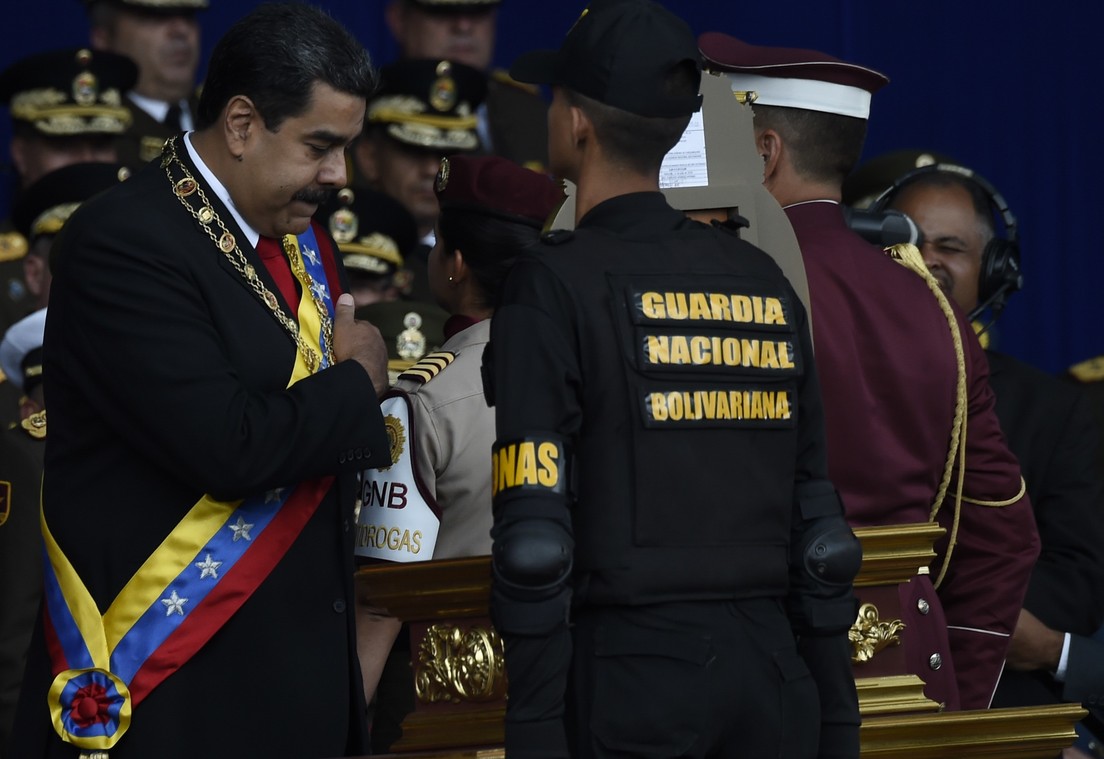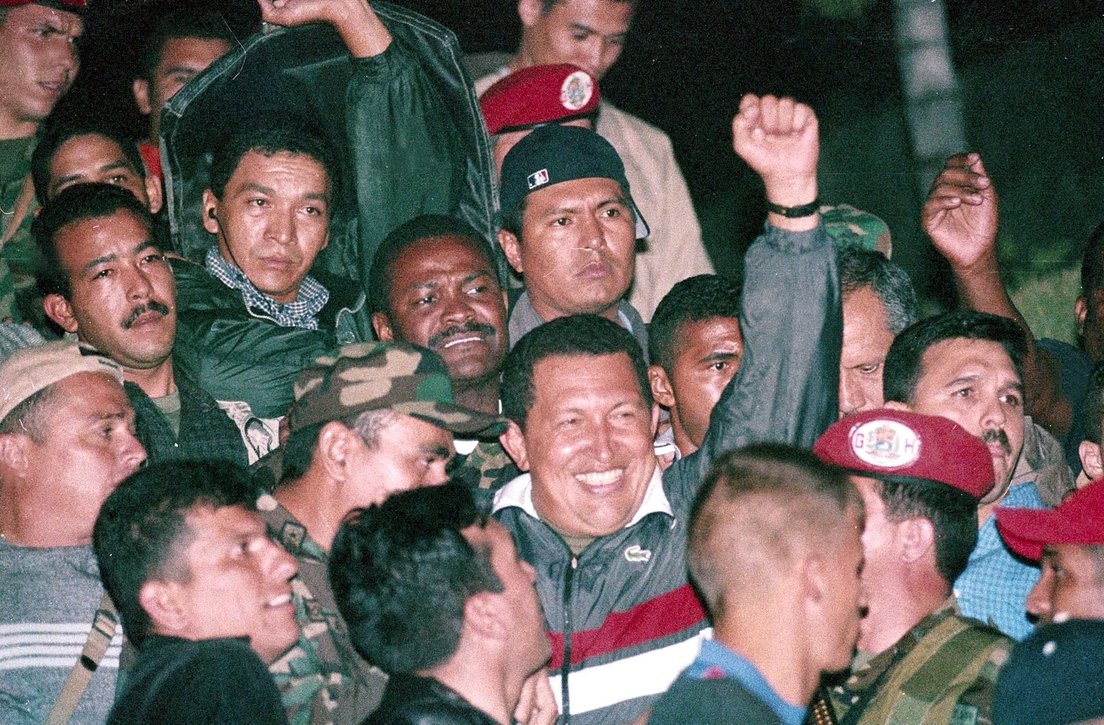Orinoco Tribune: Highlights of Rafael Correa’s Interview With President Maduro
In his conversation with Rafael Correa, the president of Venezuela remembers how in April 2002 the fateful coup against Hugo Chávez took place and how the civil-military insurrection managed to restore the commander’s power. In addition, he talks about the 2019 coup attempt, which he calls a farce. In this edition of ‘Conversing with Correa’ we address the historical processes that Venezuela has had to live through in recent years.
Video of entire interview (Spanish)
The president of Venezuela, Nicolás Maduro, in an interview with former Ecuadorian president Rafael Correa, recounted the attempts of the national and international opposition, over 20 years, to depose the governments of the Bolivarian Revolution.
In this fifth broadcast of ‘ Conversando con Correa. Coups d’état ‘, Maduro reviewed moments that have marked recent Venezuelan history, such as the coup d’état against Hugo Chávez in 2002 and the civil-military response to return him to power and the alliance of the media with the sectors of the elite economic and political.
The head of state also spoke about the two elections in which he was the winner, as well as the self-proclamation of former opposition deputy Juan Guaidó in 2019, the attempted invasion coordinated from Colombia in 2020 and the tightening of sanctions against Venezuela.

Permanent media war
The president explained that “we have 24 years of a revolutionary process that, as time went by, seeking the great changes that society demanded,” came face to face with the hegemonic bloc of the dominant classes, which “did not care about the democracy, they didn’t care about the vote, they didn’t care about institutions” and from very early on they began to conspire against Commander Chávez and against the entire process of change that he began in Venezuela.”
He recalled that with the arrival of George W. Bush to the US presidency, an escalation of confrontations began, “speeches spreading hate, speeches of political intolerance, speeches calling for the breakdown of the constitutional order” began.
Likewise, he explained that all this came along with a “great international conspiracy” and “a global media campaign” against the Bolivarian Revolution that, although it was denounced in several instances at that time, the year 2001-2002, did not succeed.
He also highlights that the behavior of the Venezuelan right, supported by the US, has always been to resort to conspiracy: “When they cannot because of the election, they resort to conspiracy.”
Explaining the mechanism of the 2002 coup attempt and the previous conspiracy, the president highlights that the old elites, which included business groups, political party leaders and media owners, “regrouped and created a truly this destabilization, of wear and tear, and they created the conditions for what was denounced in advance to be seen.
The president – when referring to the actions to depose Chávez and end the process of change that he began – asserted that, in the Venezuelan case, “the manual of the perfect coup d’état” was applied, which was also used against President Salvador. Allende in Chile.

Remember that on the country’s television and radio, all in the hands of the right-wing sectors, “24 hours a day, there came a certain moment for months when soap operas, comedies, and programming stopped showing” and in the daily programming “everything was conspiracy, reporting on right-wing movements.”
“In Venezuela, the first media coup in the history of humanity took place , which fortunately was defeated by the force of the people,” which is known as the civil-military insurrection of April 13, 2002, said the Venezuelan president.
He acknowledged that, although they knew that “something was coming” and that they discovered conversations, documents about plans to overthrow the revolutionary leader, the attack against democracy “surprised” them.
“When the coup d’état was taking place, when Commander Chávez was being detained, we said: ‘ This can’t be! Why this? ‘” said Maduro.
Along these lines, he added: “The coup d’état for us was an awakening, of knowing how far the monster can go, as Martí said: ‘I have lived the entrails of the monster and I know it ‘.”
After Chavez
In the continuation of the interview, Nicolás Maduro reviewed the attempted “revolt” when he won the presidency for the first time, in 2013, as well as Guaidó’s self-proclamation and the incursion into the South American country of a “group of mercenaries” trained by Iván Duque, former president of Colombia.
The Venezuelan president stated during the conversation that Chavismo faced “all formats and all formulas of destabilization” nationally and internationally, and that the opposition believed that the death of Hugo Chávez “meant the end of the Bolivarian project.”
In his conversation with Correa, the head of state also referred to Washington’s “overthrow strategy” during the Administration of Barack Obama, who issued a decree that declared Venezuela as an “extraordinary threat against the security of the United States.” It was the first step to open this path of destabilization,” he said.
Maduro recalled that in April 2015 he spoke with the then US president at the Summit of the Americas and that Obama told him that the decree had been a “mistake” that they were going to “fix.”
“And I told him: yes, but Obama, look at the following: you may see it lightly now, but what you did was leave a decree there where you say that Venezuela is an enemy of the United States, [.. .] and you know that when you make these types of decrees it is because you are going to almost go to war with a country. The problem is who comes after you.’ I told him that at the time, [it was] almost prophetic,” he asserted. the Venezuelan president.
In his opinion, the existence of a Venezuelan “pitiyanki right”, without values, which later contaminated the entire Latin American right, facilitated the imposition of unilateral coercive measures against his own country.
“The most painful thing was the economic consequences. We lost 99% of Venezuela’s income due to economic sanctions. We went from a year of $56 billion to another of $700 million. And how difficult it has been for us to recover income in currencies! But here we go, step by step,” he said.
“The birth of a new world”
Finally, Maduro said that “very powerful currents of change are emerging in the world, they seem irreversible, the emergence of a multipolar world, the decline of the forces of the United States and the West,” which, in his opinion, are the crystallization of “an old dream of the liberator Simón Bolívar.”
“We speak of a multicentric, multipolar world, a world without hegemonism, without empires. It seems that we are approaching that world for which we have fought so much in Latin America. And there, we, Venezuela and, I am sure, Latin America, are going to be on the front line of the battle of the birth, of the birth of that new world.

One thought on “Nicolás Maduro to Rafael Correa: “In Venezuela the first media coup in the history of humanity took place””